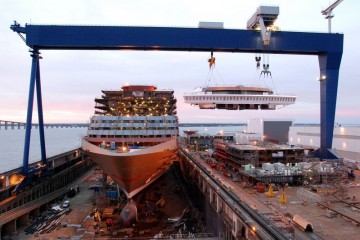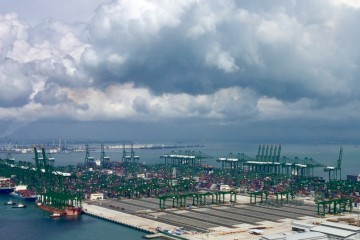There are hundred reasons why people start blogs; mine is unease. Unease with the current state of shipping, and unease with the lack of critical discussion on it. Shipping is essential to world trade and the well-being of nations, which seems to have made it immune to fundamental questions.
Questions such as: Do we always need more trade and more shipping; is shipping not actually too cheap, because all kinds of external effects are not taken into account? Is it logical to promote shipping as a clean transport mode when its exhaust gases are thousand times more toxic than of cars? Why subsidise a sector that only seems to be shredding jobs rather than creating them? Is it normal that ports crawl to every whim of shipping lines, but remain insensitive to local firms, population and the public interest? Does it make sense to throw public money at ports without coordination and then be surprised that some of them are empty?
These questions need answers. Answers that go beyond the regular shipping mantras, such as “the crucial importance of shipping to world trade”. We know this, we recognise this, but we need to address the essential questions that come with shipping, even if these are painful.
This is not taking place. The way shipping and ports are treated in the public debate is simply unsatisfactory.
The specialised maritime press identifies highly with the sector: some stay alive by organising conferences (sponsored by the industry), some sell data and services to the industry, and others have writers that come from the industry. So, more of a mouthpiece than a gadfly, in most cases. In all fairness, there are exceptions to the rule. The Journal of Commerce does not shy away from criticising US ports. And one cannot but admire the attempts of Splash 24/7 and The Loadstar to develop a more independent and critical shipping press.
The mainstream media usually do not follow shipping on a regular basis. This often results in barely disguised naivety and awe for the just discovered industry: wow, this ship is huge, this port is enormous! Understanding the sector takes some time and most reporters have other assignments before asking the tough questions – and being able to ask them again and again. Of course there are also exceptions here. The NYT ran a series of critical articles just recently. The main financial newspapers and agencies such as FT, Bloomberg, Reuters, have dedicated shipping reporters, although part of their information sources come from “industry experts” wanting to buy or sell shares of shipping companies. A commendable effort to follow shipping and freight transport on a daily basis is undertaken by the Logistics Report of Wall Street Journal.
Think tanks interested in shipping are remarkably scarce. The main intelligence on the industry is provided by specialised consultancies, often with their hands tied because of their clients. Only the most reputable ones can afford to be critical now and then: for example the shipping industry guru Martin Stopford. The most critical think tanks that cover shipping are – perhaps not surprisingly – the environmental NGOs. The work of Civic Exchange has been instrumental in reducing ship emissions in Hong Kong. Various other groups, such as T&E and Nabu regularly manage to provoke debates on greening shipping.
Academics could play a critical role, but they are all too often far away from industry or policy makers. Some, on the contrary, are too close to the maritime industry or other organisations (IMO, EU) to be really critical. Rare are scholars with practical experience in the sector, academic credibility and the willingness to raise the fundamental issues. One of these exceptions: professor Haralambides.
One regularly reads about how shipping could become more visible and more convincingly make its case, but it actually does very well in making its case – discretely via the old boys networks and support to friends of the industry. This operating mode seems to work well for most of the industry. However, this is not necessarily in the public interest. The public interest is served with shedding light where darkness reigns.
That is what this blog wants to do. Ask the painful questions, provoke the discussions that are needed, comment on what happens. Because a sector that is so important needs a serious discussion. Not out of belligerence, but as a sign of love.
38 Comments
Comments are closed.




Good luck! You have opened a window of fresh air, Olaf!
Thanks for the mention Olaf and best of luck (which, I am certain, you won’t need). The most gratifying thing for me is that we share the same views. And we should build on this going forward.
Great initiative Olaf and asking many right questions. Looking forward to read your next thoughts.
Goodspeed…
Couldn’t agree more with you Olaf! A lot must change in this industry. Very much hope that this blog will help bring realisation to many in the industry!
Great views on a highly ignored but equally important subject
From Hong Kong polytechnic university
Best of luck, Olaf — and bless you for the mention!
Super good Olaf and let the game by well reflected problems with eve better solutions begin!
The biggest challenge is to first educate people in a most unbiased way what shipping is and can only be?
Shipping is just a sub product consequence business from global trade between businesses and I guess this is the thing shipping do not like while shipping would like to be treated and respected as the cause to the afore mentioned. A lot of ego has naturally been connected to shipping due to environment(al) stressors. Looking forward to learn what you are pondering and wondering about and what would be the best short and long term solutions to the same. I will try to tune in and give my view as well if and when and for what it is or might be worth.
Good luck, fair winds and following seas!
Great initiative Olaf, and those questions resonate with us too, look forward to reading more
Good decisions Olaf. Shipping needs to he questioned in order to get improvement.
Working on air quality issues for the environmenatl NGO NABU which you thankfully mentioned I would like to express my respect that you invite the port and shipping community for a more critical debate about the business. You are right to state that there are exceptions from the rule and several good examples of corporate responsibility can be found all over the world. When I talk to people from the business everybody is open-minded and hardly anyone is denying problems. But when it comes to competition or financial commitments in terms of social or environmenatl obligations the vast majority is closing the eyes and is willing to ignore the enormous impacts of shipping industry. It all about business. We are grateful for any kind of contribution and you certainly will have our support. All the best!
Good luck with this new blog- which I will be reading frequently.
Olaf – congratulations on an ambitious and relevant undertaking. Your voice is a welcome addition to a rarefied shipping media landscape that often seeks to imply inevitability rather than question assumptions.
I welcome this initiative and will strive to follow and participate in the discussions that will emerge. The passion for the maritime world is ingrained in me and I read with great interest all I come over concerning shipping. Good lick Olaf and see this as a support for your blog and participation of the future shipping discussions.
These are comments that need saying. Shipping is the invisible industry. It is disadvantaged because the general social and polictical cultures do not understand its real value. Publicity when it occurs generally is negative.
The think tank Canadian Council of Academies is beginnning a study on the Social and Economic Value of Commercial Marine Shipping in Canada. http://www.scienceadvice.ca/en/assessments/in-progress/value-marine-shipping.aspx
This is the first study of which I am aware which is looking at the social and well as economic value of shipping.
Welcome to blogging Olaf.. 🙂 We definitely need more such voices from shipping perspective.. 🙂
Outstanding! This is sorely needed!
Shipping, at least when it comes to ships and seafarers, is extremely well regulated. I do not think anyone is complaining about the mode of transport.
Well done Olaf. You know me, I know you and we both have the same ideas for a long period about the big money spending maritime triple E vessels. As a result of this we have now overcapacity on terminal side. Let’s stop the neo liberal propaganda.
[…] settimana dal noto economista Olaf Merk. Vi consiglio l’editoriale nel quale Merk denuncia la mancanza di un confronto costruttivo sui temi attuali dello shipping internazionale e critica (salvo rare eccezioni) la stampa di settore… Giudizio che […]
Good luck, Olaf, with this new and important initiative!!!
PORTUS, the magazine of RETE association, will support your effort!
Olaf, I really look forward to following your blog and participating in the discussion going forward.
Good initiative Olaf. The exchange and the contradiction will be always the best solution to imagine the best future for shipping and ports!
Well, Mr. Merk.
Not too bad for a start. Got some warm welcome applause, so far. But? Where’s the beef? Looking forward to read your critical and painful questions and hope, there will be some interesting answers coming up.
Let me post some (inconvenient) opinions:
Public discussion about the shipping industry: Which “public” should be interested to discuss matters, as long as you can by your $ 1,- t-shirts at your local shop??
Why does nobody question, how carriers can offer prices to their customers which would raise several economists eyebrows?
Why do carriers have to “shred” jobs in order to stay competitive in this volatile environment?
The last “Old Boy Clubs” have certainly died with the demise of the conferences. But was that really a wise decision or driven by certain “interested parties”????
Looking forward to reading more from you. Best regards HP
Love the idea of this blog. Well done Olaf! I will definitely be looking at this space…and pitching in my six pence.
Good luck Olaf with this new blog.
Olaf, all my best for this new blog. The Industry needs to go beyond their usual questions. As you said Thérèse us Numbers of newspaper ans magazines that look at Shipping either un french or un english. Ne sure we’ il follow you ans thé community.
Als already stated by Mr Hans Peter Baker about 1$ Tshirt, I can add that we now can write “blog” while there is a net of low cost server around the world builded in far east at low price of labor and carried worldwide by shippimg. And , maybe, you are writing mobile with one of these last generation devices always made in far-east.
The real question isn’t if shipping, harbour, trade etc. are necessary but if they are really necessary with all advantages and disadvantages.
The same we can think about global massive mobility with planes, airport, cars, highway etc.
Massifying tourism that bring million of people in smaller cities or in newly resorts constructed with thousands tons of concrete like a fllood over nice corners of our planet.
Maybe there will be a 50% that answer yes and the other 50% no.
I think we have to change mind over previous issues , but on many others too, that progress has carried us away from a real sustainable life..
Too much philosophy but I have questions too , like you, but I don’t have answer.
.
Interesting
Thanks for this initiative. The problems your are describing can only solved internationally. And here we still have the principal problem of the sea-blindness of the majority of states. Who really is interested on questions of maritime security? In 2014 I tabled a book mostly in German “Maritime security in the 21st. Century”. Reactions? Only by some experts. Speaking about the oceans as one of our global commons: politicians react normally with yes, we have to deal with these questions. And then? Nothing happens.
Great iniative mr Merk, and off to a promising start! I look forward to reading more.
I like this overview and it does highlight problems.
However I would suggest that it should be expended to include trading associations. Why? Because at a base level ‘ships’ exist to carry cargo and it is the Trading Community that charter ships.
For example +80% of world trade in cereals is carried on GAFTA [The Grain & Feed Trade Association] contracts & +80% of oilseeds are carried on FOSFA [The Federation of Oil Seeds and Fats Association].
Trade Association standard form contracts generally have a clause that requires the use of “1st Class” vessels – so Traders are contractually interested in the quality of vessels they charter and the efficiency of the ports through which these cargoes flow.
It seems to me that this section of “Shipping” does not always get the chance to contribute to the discussion.
Some time ago I was asked by GAFTA to respond [at very short notice – hours not days] to attend a meeting in Rotterdam where the ‘directive’ was to make receivers responsible for the quality of the vessels that discharged in Europe. I believe that the UK representative was the Road Haulage Association!
That itself gives an idea of the lack of understanding of “Shipping”.
The Trading community should be encouraged to join in these discussions – especially since under English law there is a requirement for a Seller “to make a reasonable contract of carriage on behalf of the Buyer having due regard to the circumstances of the case” [See section 32(2) of the English ale of Goods Act 1979]
Many traders appear to be unaware of this liability when entering into international trades.
Will follow this with interest & hope my comments assist.
Ahoy OLAF MERK
I enjoy following the shipping news and the many discussions generated by the numerous postings. Look forward to seeing the development of your new endevour.
Fair winds –
Richard
Olaf, thanks for this relevant initiative at a time of major changes in global value chains; it’s so pleasant to travel the world through your analyses on global shipment; it also has to do with underlying issues such as logistics and industrial patterns. Good luck to your new blog ! Corinne
Olaf, congratulations on your new blog, I share your uneasiness, but regretfully the current Shipping buisness is just a reflection of what the Shareholders thought it was. No one is getting reality pills, the marktes plunged, changed, and all that was ricocheted. There are no real marketing plans, just a “fill the ships with cargo” mentality. This, on the long run, will continue to ruin the whole world economy.
All to often the principals seem to fail to understand that they are part of a larger global transportation system and that often the optimization of a particular component of that system results in moving the problem elsewhere in the system. There is no net gain at the system level. The shipper cannot avoid seeing and being affected by the system. Of what value are low transportation costs if they are eaten by higher costs elsewhere in the system? The system view is, of course, of little other than academic value if the system is not operated as a system. This requires governance at the system level, something that may be impossible to achieve.
[…] Retrieved from: https://shippingtoday.eu/a-new-shipping-blog-out-of-unease/ […]
I just found this blog and it is the first of its kind for me. All of the other blogs I find or subscribe to are all about a company and its services or products. This one is being built around a “topic”. I have a lot of questions I will want to put out for discussion so I will be following very closely.
This is a fresh idea and a very ambitious undertaking Olaf. Congratulations!